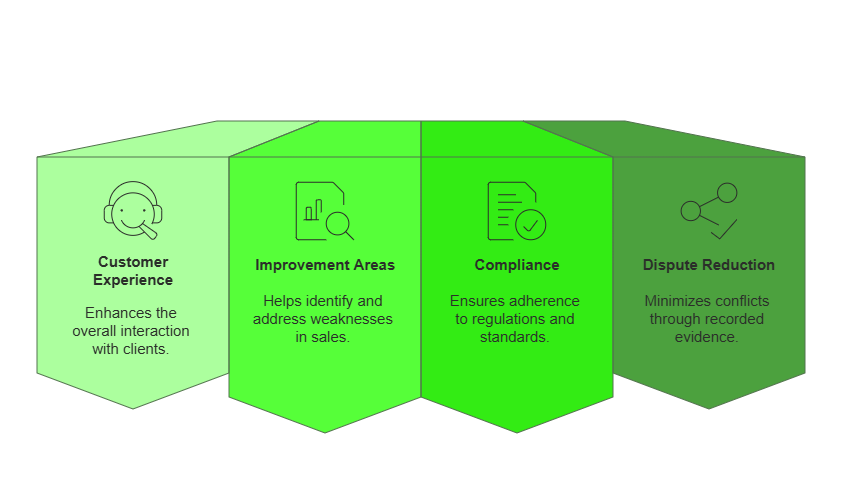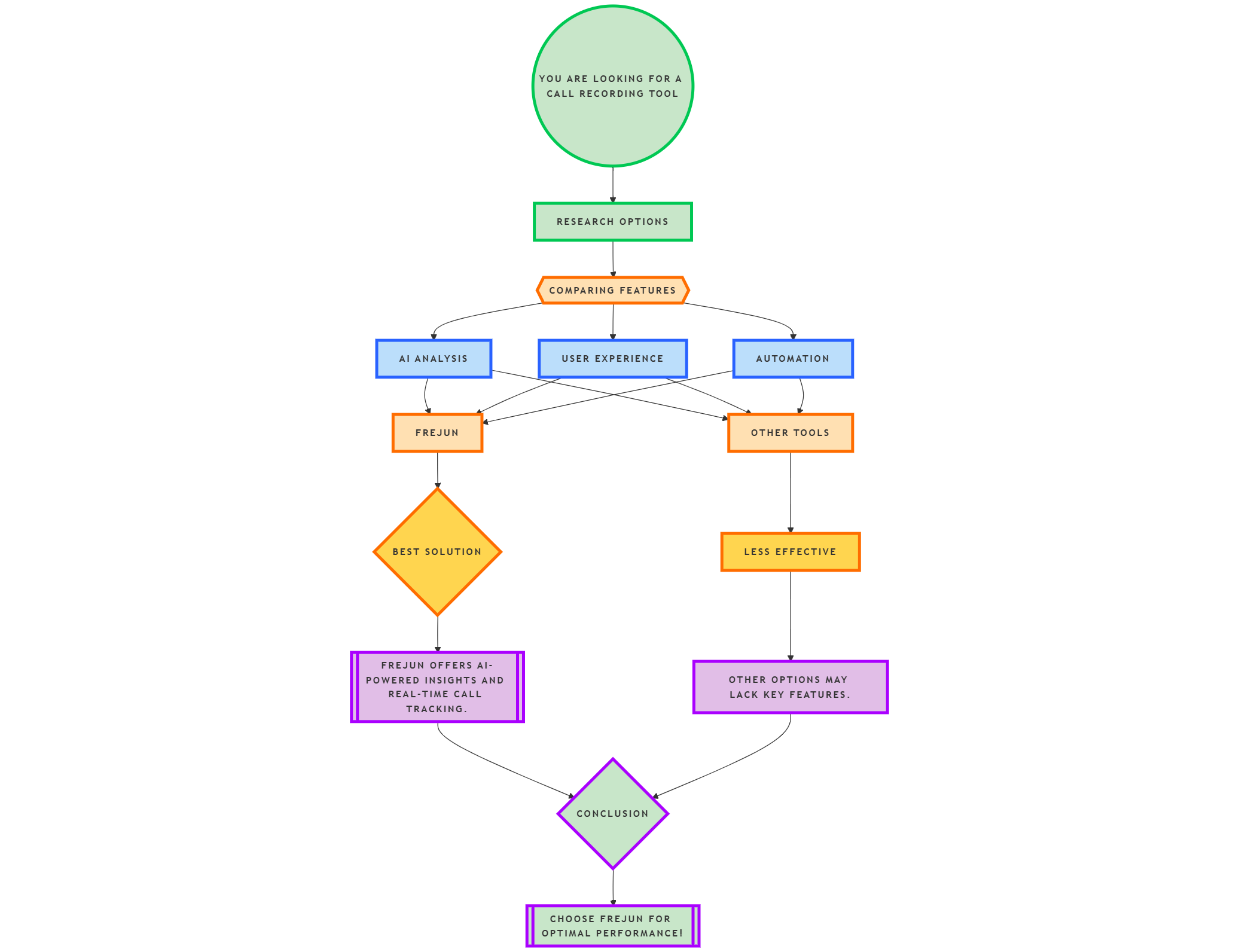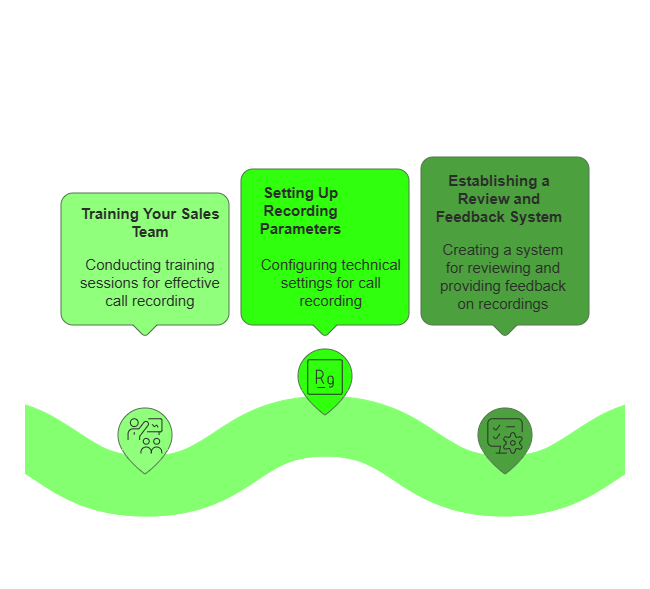In 2025, Competitive business landscape maximizing sales is essential for growth and sustainability. One often overlooked but incredibly powerful tool for enhancing sales performance is call recordings. Whether you’re in sales, customer service, or marketing, utilizing call recordings can provide you with invaluable insights that lead to better strategies and, ultimately, more closed deals.
In the world of sales, every phone call presents an opportunity. To get the most of those opportunities, it’s essential to have a reliable call recording solution. By recording and analyzing calls, you can identify successful sales techniques, recognize common objections, and monitor and measure sales performance. In this article, we’ll explore the advantages of call recording and how to implement it in your sales process.
What Role do Call Recordings Play in Maximizing Sales Success for Businesses?
Call recordings play a pivotal role in enhancing sales performance and driving business success by serving as a critical resource for analysis, training, and continuous improvement. In today’s data-driven environment, leveraging call recordings allows sales teams to extract valuable insights from every interaction—transforming routine conversations into powerful learning tools.
1. Customer Insight and Behavioral Analysis
Recorded calls allow businesses to analyze buyer behavior, preferences, and pain points in a nuanced manner. Patterns identified through call transcripts can inform sales strategies, product positioning, and even marketing campaigns. This customer-centric approach helps teams tailor their messaging, improving engagement and conversion rates.
2. Performance Monitoring and Feedback
Call recordings provide managers with a direct window into how sales representatives interact with prospects and customers. By reviewing these calls, managers can identify strengths, pinpoint areas for improvement, and deliver targeted, actionable feedback. This ensures that team members are not only adhering to best practices but are also continuously evolving their communication skills and sales techniques.
3. Sales Training and Onboarding
High-performing sales calls can be used as real-world examples during onboarding and training sessions. New hires gain a deeper understanding of effective pitches, objection handling, and successful closing techniques by listening to actual conversations. This accelerates their ramp-up time and ensures consistency in messaging across the team.
Key Metrics Analyzed from Call Recordings
| Metric Name | Insight Gained |
| Customer Sentiment | Detects positive/negative responses |
| Keyword Analysis | Identifies impactful words & phrases |
| Call Duration | Determines engagement levels |
| Conversion Cues | Highlights effective closing strategies |
| Rep Response Time | Measures sales rep efficiency |
The Importance of Call Recording in Sales

Call recording is an invaluable tool that provides several benefits for sales teams. It helps enhance customer experience, identify areas for improvement, and ensure compliance and reduce disputes. However, call recording is not just a tool for sales teams; it is also an essential tool for businesses that want to improve their overall operations and customer satisfaction.
1. Enhancing Customer Experience
Recording calls allows you to review interactions between your sales representatives and customers. You can analyze the calls to identify areas where you can enhance the customer experience, such as improving your representatives’ communication skills, reducing wait times, and increasing empathy towards the customer’s concerns. By doing so, you can improve customer satisfaction and loyalty, which can lead to increased sales and revenue.
Furthermore, call recording can help you identify trends in customer behavior and preferences. For example, you may notice that customers are frequently asking for a specific product or service. By identifying these trends, you can tailor your offerings to meet customer demand and stay ahead of the competition.
2. Identifying Areas for Improvement
By analyzing recorded calls, you can identify areas where your sales representatives need additional training. You can pinpoint common mistakes, such as not effectively addressing customer concerns, and tailor training sessions to help them improve their skills. This can lead to increased sales and customer satisfaction, as well as a more efficient and effective sales team.
Moreover, call recording can help you identify areas where your sales process may need improvement. For example, you may notice that customers are frequently dropping out of the sales funnel at a specific point. By identifying these areas, you can make changes to your sales process to improve conversion rates and revenue.
3. Ensuring Compliance and Reducing Disputes
Compliance is a crucial aspect of any sales process, and call recording helps ensure your team complies with local and federal laws. Moreover, it helps reduce disputes that may arise between customers and your sales representatives, providing a reliable record of the conversation. This can come in handy in case of lawsuits or other legal proceedings.
Furthermore, call recording can help you identify any unethical or illegal behavior by your sales representatives. By doing so, you can take corrective action and prevent any legal or reputational damage to your business.
Recording calls is an essential aspect of modern business communication. It helps organizations to monitor and analyze customer interactions, improve customer service, and comply with regulatory requirements. However, choosing the right call recording solution can be a daunting task, given the plethora of options available in the market.
Choosing the Right Call Recording Tool for Sales

Cloud-Based Vs On-Premise Solutions
Another critical factor to consider when selecting a call recording solution is whether to opt for a cloud-based or on-premise solution. Cloud-based solutions offer several advantages, such as easy scalability, quick deployment, and cost-effectiveness. They also eliminate the need for organizations to invest in expensive hardware and software infrastructure.
On the other hand, on-premise solutions offer better control over data privacy and security. They allow organizations to store call recordings on their servers, ensuring that sensitive information remains within their control. However, on-premise solutions require significant upfront investment and ongoing maintenance costs.
Evaluating Cost and ROI
Cost is another critical factor to consider when selecting a call recording solution. Organizations should choose a solution that provides the features they need at an affordable price point. They should also factor in the ongoing maintenance and support costs associated with the solution.
However, cost should not be the only consideration when selecting a call recording solution. Organizations should also evaluate the expected return on investment (ROI) of the solution. A good call recording solution should provide actionable insights that help organizations improve their customer service, increase sales, and comply with regulatory requirements. These benefits can translate into significant ROI for the organization.
In conclusion, selecting the right call recording solution requires careful consideration of several factors. By paying attention to the key features, deployment options, and cost and ROI, organizations can choose a solution that best fits their requirements.
Implementing Call Recording in Your Sales Process

Now that you have selected the right call recording solution, it’s essential to implement it correctly in your sales process. Call recording can be a valuable tool for improving your sales team’s performance and providing better customer service. Here are some tips to get you started:
1. Training Your Sales Team
It’s essential to train your sales representatives on the new call recording process. Training should not only cover the technical aspects of the system but also the benefits of the new system and how to use it effectively. Sales representatives should understand how call recording can help them improve their sales techniques, identify areas for improvement, and provide better customer service.
Training should focus on how to initiate, pause, and stop calls, how to use custom tags and categories, and how to analyze call data. Sales representatives should also be trained on how to use call recording to identify customer pain points, understand customer needs, and provide better solutions to their problems.
2. Setting Up Recording Parameters
When setting up recording parameters, you should consider your company’s policies and state and federal regulations. You should ensure that you comply with all legal requirements and regulations.
Recording parameters may include notifying customers that the calls are being recorded, which calls to record, and the length of time to store recorded calls. You should also consider whether to record all calls or only specific calls, such as those related to sales or customer service.
Setting up recording parameters will help you ensure that you are only recording the calls that are necessary and that you are storing them for the appropriate length of time.
3. Establishing a Review and Feedback System
Once you have implemented call recording, you should establish a review system for recorded calls. Managers should listen to calls regularly and provide feedback to the sales representatives.
The feedback provided should be constructive and focused on helping sales representatives improve their sales techniques, customer service skills, and overall performance. Feedback may include positive reinforcement, constructive criticism, and suggestions for improvement.
The review system should also be used to identify areas where additional training may be necessary.
For example, if multiple sales representatives are struggling with a specific aspect of the sales process, additional training may be necessary to help them improve.
By implementing call recording and following these tips, you can improve your sales team’s performance, provide better customer service, and ensure that you comply with all legal requirements and regulations.
Analyzing and Leveraging Call Data
Recording calls is only the first step. To get the most out of your call recording solution, you should analyze and leverage the call data. Here are some tips to help you:
1. Identifying Successful Sales Techniques
By analyzing recorded calls, you can identify successful sales techniques. You can notice how your representatives communicate with customers, the tone of voice they use, and the questions they ask. This can help you understand what works and what doesn’t when it comes to selling your product or service.
For example, you may find that customers respond well to a friendly tone and a personalized approach. By identifying the common elements of a successful sale, you can train your team to leverage those techniques and improve their sales skills.
2. Recognizing and Addressing Common Objections
By listening to recorded calls, you can identify common objections that customers raise. Such objections may include pricing, features, and competition. By understanding these objections, you can train your sales representatives to address them proactively.
For example, if you find that customers often object to the price of your product, you can train your sales team to emphasize its value and explain why it’s worth the cost. By addressing objections before they become deal-breakers, you can increase the chances of closing the sale and improve your overall conversion rate.
3. Monitoring and Measuring Sales Performance
Call recording also helps you monitor and measure sales performance. By tracking key performance indicators (KPIs) such as call volume, conversion rate, and average handle time, you can identify areas for improvement and measure the success of your sales process.
For example, if you find that your conversion rate is low, you can analyze recorded calls to identify where your sales team is falling short. Are they failing to address objections? Are they not communicating the value of your product effectively? By pinpointing the problem areas, you can provide targeted training and coaching to improve performance.
In conclusion, call recording is a valuable tool for any business that wants to improve its sales process. By analyzing and leveraging call data, you can identify successful sales techniques, address common objections, and monitor and measure sales performance. This can help you improve your conversion rate, increase revenue, and grow your business.
Conclusion
Call recording is vital for any sales team looking to maximize its potential. It helps enhance customer experience, identify areas for improvement, ensure compliance and reduce disputes, and monitor and measure sales performance. By choosing the right call recording solution, implementing it correctly in your sales process, and analyzing and leveraging call data, you can take your sales process to the next level and close more deals.
In 2025, leveraging call recordings is no longer optional it’s a must for businesses aiming to optimize their sales processes. By using AI-driven tools like Frejun, you can gain data-driven insights that directly impact your bottom line.
Start maximizing your sales today by adopting smart call recording strategies and integrating Frejun’s advanced features into your workflow.
Further Reading- The Ultimate Guide to Call Recording Software for Sales Teams
Frequently Asked Questions
Call recordings provide insights into customer needs, allowing sales teams to refine their approach and improve conversion rates.
Call recording can be enhanced through automatic recording, coupled with AI-powered analysis and smart analytics. This enables sales teams to review and learn from customer interactions more effectively.
Yes, call recordings serve as effective training tools, allowing new sales reps to learn from real customer conversations. FreJun simplifies this with organized call histories.
Absolutely! By analyzing call recordings, sales teams can identify successful tactics and areas for improvement. FreJun provides detailed analytics for better strategy optimization.
Yes, secure call recording storage is crucial for protecting sensitive data. With encrypted access, call recordings are kept safe and comply with regulations such as GDPR or industry-specific standards.
Yes, analyzing call recordings helps identify customer pain points and improves service quality. FreJun’s analytics features offer valuable feedback.
Yes, sales managers can use call recordings to evaluate the performance of sales reps, ensuring that targets and standards are met. FreJun simplifies this process with its advanced analytics.
Subhash is the Founder of FreJun, the global call automation platform. With 8+ years of entrepreneurial experience, FreJun was established to help customers with their voice communication needs. The goal of FreJun is to develop cutting edge technology and solutions to help customers.
